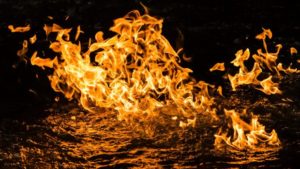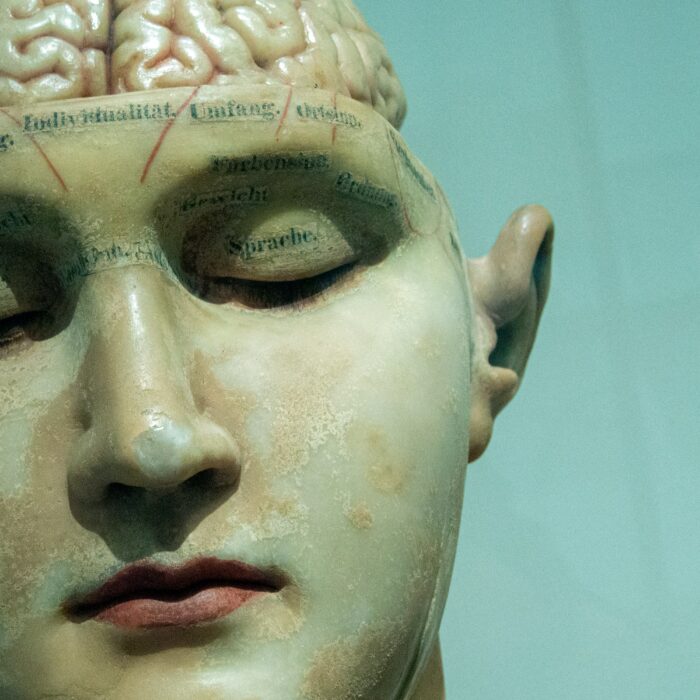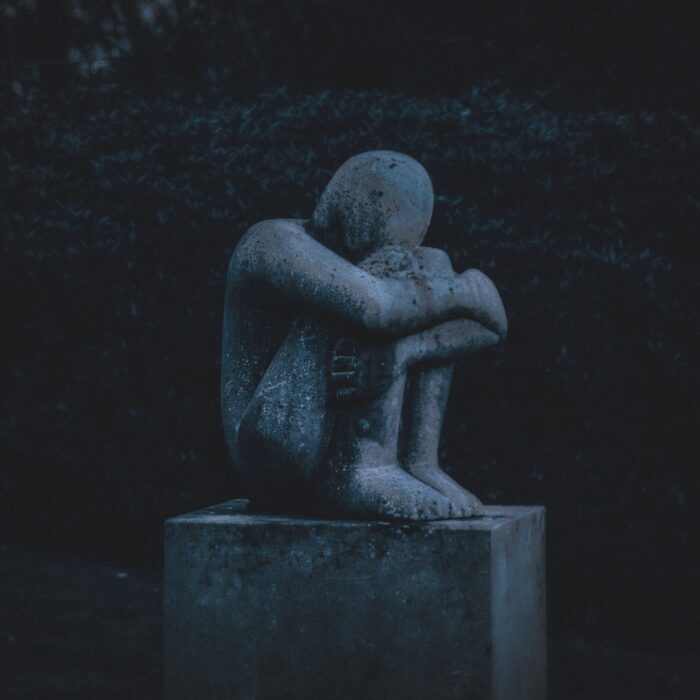You have no items in your cart. Want to get some nice things?
Go shopping The end came faster than he could have hoped.
The end came faster than he could have hoped.
Coyote, twenty-nine, balding since seventeen, who could be seen each morning at his company’s office building through the tinted windows of the fourth floor gym, a ghost with fluorescent aura beginning to be erased by encroaching daybreak; who hadn’t taken a vacation since joining this above-average, but only just, medium-to-large corporation of chartered accountants (specialising in US taxation and non-Canadian residents) as an intern fresh out of York University; who’d finally proposed to the stylish and almost always confident Emmeline from Excellence! magazine (floors six and seven) after a rocky three years of on-again, off again courtship—punctuated sometimes by diffidence on Coyote’s part, more often by the lady’s penchant for sudden, explosive affairs with shaggy-haired guitarists invariably Californiabound—had conclusively determined once and for all, six weeks post popping the question, that this engagement was as stalled as an out-of-service elevator ever since Emmeline claimed to have lost her engagement ring at the indoor pool only for it to resurface a week later in the ground floor Recycling Room.
All Coyote could think, on opening his office door to the zealous, a newly hired cleaner who answered his LOST notice in the VIP lounge, was that traces of his own recent yet utterly foreign youth were painfully reproduced in this boy’s hopeful, African-American visage. At least Coyote had the presence of mind to tip him a fifty-dollar bill (was the reward too small or too large?).
Coyote, twice named Young Accountant of the Year (’08 and ’10) by the Institute for the Personal Growth and Enrichment of Chartered Professional Accountants, who was halfway through the eighty-hour Certification in Advanced First Aid (complimentary for employees keen to upgrade the basic requirements of workplace health and safety which seemed rather, well, basic), suddenly found himself divested of the townhouse he’d acquired mere months ago in hopes of matrimony—“It’s a seller’s market,” his estate agent assured him, “Not so good for the buyer, but leave town for long enough and the wind will change”—his wardrobe condensed to a couple of Ralph Lauren polo shirts and Banana Republic chinos in an Eddie Bauer duffel bag, his resignation approved with moderate reluctance by the company, and an open return air ticket to India tucked between passport pages in the interior compartment of his fanny pack.
The fanny pack was a relic from his first and last trip abroad, aged eighteen, on a European tour bus. As soon as he buckled it around his waist, he remembered he’d always hated it for its embarrassingly protuberant bulk, but it was too late: the taxi was already at his front door. And now, as if to underscore the point, he could feel it gouging a fist-sized cavity in the soft flesh of his lower abdomen, uncomfortably close to the pubic bone, as he strained over the edge of a small motorboat somewhere along the River Ganges, a box of matches in one hand and an unlit tea-light in the other.
Less than an hour ago, one hundred rupees had bought him the white candles in pleated paper cups, each one garlanded with withered marigolds in a banana-leaf boat. He hadn’t wished for thirteen of them but the street vendor snatched his vaguely proffered bank bill, leaving Coyote with the familiar sensation of having gained more than he’d bargained for—except there had been no bargaining.
“You have no initiative,” Emmeline had said. “It was my idea to get engaged.”
“I arranged for the photographer and the bandoneon,” Coyote said.
“You know I don’t like French music,” she said.
“It wasn’t French,” he began. “We just happened to be in Montréal that weekend—”
“Forget it,” she sighed. “Why don’t you try using your imagination?”
She was dissatisfied. This Coyote could see with increasing clarity as he pounded the treadmill, watched his reflection in the floor-to-ceiling windows disappear and, in the week of the engagement ring’s absence, as he carefully sifted through the contents of every vacuum cleaner in the building. After the ring was returned, he couldn’t recall if she’d actually put it back on.
Now the sun was rising above the Ganges, a pink orb grazing the far shore. On the opposite side, a crescent moon floated above a crumbling palace, an open-air crematorium, and men and women bathing in the thick green waters. Submerged to their waists, still clothed in their undergarments, the bathers seemed oblivious to the proximity of corpses laid on the shore beneath colourful, patterned shrouds. Coyote had seen similar designs on bed sheets and tablecloths hanging from washing lines and amongst market wares on his ride from airport to hotel, bouncing in the back of a tuk-tuk, blasted by exhaust fumes and the inescapable stench of burning waste that seemed to permeate the whole country—paper, plastics, cow dung, human flesh.
The bathers laughed and jostled as they cupped water in their hands and poured it over each other—the same water anointed the living and the dead. Daily, the bathers prepared for their own funerals, joyfully awaiting their turns to be consumed by fire.
Coyote had joined an excursion of Americans, his passage bought with his offering of candles. “For the river god,” Coyote told them cheerfully. He couldn’t remember exactly what he’d read as he surfed the net, inputting search phrases such as “backpacking to seek the meaning of life” or “atheist spiritual quest India?”
“How adorable,” gushed one lady, burying her nose in the marigolds.
Coyote thought of the hawker’s blackened fingers.
“Are you from Canada?” quizzed her husband.
According to the Personal Income Questionnaire routinely given to all clients, you paid taxes according to where you’d made money in the last twelve months. Further questioning of the past was irrelevant. You filled in the form to the best of your knowledge and prayed you would pass. You spent your life wading through similar forms, inputting data against the clock. For the whole of his adult life, Coyote and the clock had been cruising neck-to-neck in a race whose outcome was fixed. Still, he enjoyed a certain unquantifiable and vicarious thrill: the sense that something of his opponent’s tireless resilience and, well, immortality, was being transferred to him by virtue of sheer exposure—much like the ageing effects of UV rays. In rare, superhuman moments Coyote even took the lead, never for long but just enough to earn accolades like most promising, second-in-line, probable-husband-to-be of the evasive Emmeline who had recently been appointed Beauty Editor and was poised to ascend the pantheon of Excellence! via Art Director to, one day, Editor-in-Chief.
Coyote struck the first match. You made a wish, cast the candles to the river and watched them flicker, fire on water—or so he had read online.
The match went out. None of the websites had warned him about the wind.
Coyote struck another match and sheltered the feeble flame with his hand. It took to the wick for a few breathless seconds—“Ooh,” gasped his fellow passengers—then fizzled out.
In the green water, banana-leaf boats drifted by. In the boats were spent candles, oozing and misshapen with short, blackened wicks. Most of the marigold garlands were incomplete or missing altogether.
Coyote shook the matchbox and it rattled like a broken toy. Some of the matches landed in his hand; others fell onto the deck and lay intermingled with those already spent.
“Hang in there, folks,” said Coyote. “Too early to give up yet.”
His voice was not his own. It was the voice of breakfast television, of inconsequential reports on food and fashion, and interviews with minor celebrities. The voice whiled away the grey, pre-dawn hours, occasionally interrupted by more serious segments on world news and weather. It twittered on in the background in the Cardio Corner, muffled by the treadmill’s motor, comforting as a dawn chorus. Except on TV there was always laughter, even if it was canned.
The expressions on this audience’s faces were blank, a puzzle. The boatman gazed with inscrutable fascination at the sky. Probably he didn’t understand English.
The websites called India “the spiritual centre of the world,” as if India was not a country but an essential, hidden organ without which no other country could exist. A purplish, pulpy spleen or belaboured heart, distended and riddled with veins. The world flocked to India to discharge its ills and be recharged by life-giving forces not found in the staple North American diet: the zeal of devotion, the taxation of ritual, the rapture of sacrifice. Surfing the web late into the night, Coyote pieced together a vision of a hitherto unimaginable way of life; a life which, if it had previously, incongruously been presented to him among the glossy pages of the Condé Nast Traveler, would have horrified him. He would perform the rites of penance until his hair grew past his shoulders. He would backpack through the desert until his sandals were shreds. He would learn to live without money. He would sleep naked under a sky where the sun and moon coexisted peacefully, as in ancient times when there was no such thing as death.
Coyote himself would vanish, leave no trace except perhaps the memory of love—self-conscious, precarious and half-baked, but love nonetheless.
By now, the stack of spent matches at Coyote’s feet resembled a miniature pyre. He crushed the empty matchbox and dropped it on the heap.
“Umm … does anyone have a lighter?”
The propeller churned. The audience was slow to react. There was a rustling of parkas, of crackling static as they groped in their pockets, fumbled amongst bottles of mineral water, sunblock, Advil, granola bars, mosquito repellent. Between them, they were well-prepared for a multitude of small calamities. It occurred to Coyote that these people could not imagine other, more critical emergencies involving the need to swim, or failing to swim, or sinking like a stone in the opaque water.
Take the craft that bore them, a vessel doomed to fail a safety inspection at any respectable marina back home. Where were the lifejackets, the distress flares, the spare drain plugs? Coyote glanced around for the capacity plate—wasn’t the boat listing alarmingly to starboard on account of one passenger whose girth was the equal of two persons at least?—with a familiar, if indistinct, sensation: a potent cocktail of dread and curiosity.
There had been one morning, unprepossessing as all the others at first, when Coyote accelerated the speed of his treadmill, by increments, beyond the spectrum of the humanly possible. His feet flew faster and faster until he seemed to glide for effortless moments above the black rubber conveyor belt, furiously spinning. He felt as though he was approaching the speed of light. Coyote spread his arms in the gesture of a marathoner at the finish line, feeling his body transcend the possible as if crossing the shimmering threshold between dreamer and dream. Then, primed for flight, the machine betrayed his trust, his next step skewed inward, his ankle painfully angled by the sudden torque, flinging him off-course into the handrail while the belt torque blithely continued to run. A fellow early bird hurried over with a timid “Are you alright?”—as if “alright” was any plausible description for this tumble out of sublime weightlessness into winded mortality. Coyote stayed motionless, head bowed, gripping the handrail, his breaths harsh and irregular. The Samaritan retreated.
Now, as he watched the Americans rummage through their drugstore supplies, seeking some sort of fire-starting device and finding none, Coyote felt the stirrings of a reluctant foreboding. Without intending to, he found himself searching his own pockets even though he had smoked less than a handful of cigarettes in his life, all of them in some poorly lit bar after an inadvisable amount of alcohol, in the aching, ever-restless company of Emmeline, whose presence was at this moment more palpable than when she was within reach.
He found the bullet-sized bit of black plastic—a logo, Neo World, inscribed in silver on one side—in the secret compartment of his fanny pack. You depressed a switch at its centre and a USB jack popped out from one end of the bullet. It had taken Coyote another month after receiving this cryptic gift from his betrothed (though it was December, it wasn’t a stocking stuffer, and his birthday was two months away) to figure out that when the switch was pushed in the opposite direction, a coiled tungsten filament was activated, brightening within seconds to a glowing amber.
He stowed this token of Emmeline’s affections—those gossamer-fine, insubstantial traces of warmth and promise, impossible to grasp without resorting to representation in grosser terms (a Birks ring, tickets to the Opera, a whiff of Chanel Cristalle, a hybrid USB flash drive and flameless lighter)—in the breast pocket of his suit jacket. Often, he forgot it was there and turned it into the dry cleaners’ along with the suit. This was of no consequence since he never put Neo World to either of its intended uses. While packing for the pilgrimage he had slipped it into his fanny pack as an afterthought, unsure of what it signified anymore (if anything at all). Emmeline might as well have given him a vial of her blood. It occurred to Coyote that such a gift would be as meaningless as the object currently in his palm.
Coyote’s fellow passengers sat on the gunwales, their upturned faces as baffled as the wilted marigolds with their moulting, wind-ruffled petals. The banana-leaf boats were clustered on top of the wooden box that housed the motor. They trembled and shook along with the warped, splitting boards covered with peeling blue paint.
“Throw him to the river god,” came an anonymous jest, a stage whisper. A few halting guffaws followed in uneasy tandem, lost to the wide river and boundless skies.
“You know,” said Coyote to his audience, “An unlit candle is the greater sacrifice. An invisible flame will never die.”
No one laughed. A strange spark had been struck by the edge in his voice, a blade suddenly unsheathed, forged in fire, quenched in brine. Coyote had no time to wonder where it came from, this dark fire that passed through him like a current, whose only evidence was the briefest of sparks that flickered blue against blue skies—was it really there?—then vanished. Already its heat was fading.
Coyote held up Neo World like a magician’s hand—now you see it, now you don’t—and released it to the water with a flick of his wrist. “Get it?”
The silver typeface caught the morning sunlight, managing to flash once before the lighter sank beneath the surface. Above, seagulls swerved and circled aimlessly. They flapped their wings briefly then let the air currents carry them, surfing as long as they could without falling from the sky. Big-bellied, overfed by tourists, they had no reason to fly.
“Hurry,” said Coyote, “or we’ll be back on shore and you wouldn’t want bad luck now, would you?”
Grumbling, they obeyed. There were eight or nine of them and they were middle-aged or older, and less than agile. They assembled in a loose train and took turns tottering the few swaying steps between motor and gunwale. Kneeling on the damp, splintered wooden ledge and bending over the railing—cautiously lowering their offerings to the water and releasing them at the last possible moment—was not easy. They did so anyway, with care, as if their candles were lit as if solemnity would imbue their actions with portentousness.
As if, for the first time in his life, Coyote was the only person not taking himself seriously.
Coyote perched on the edge of the prow and wondered if he ought to apologise, to call out, “Wait, I didn’t mean this, it was a mistake,” or if their actions had nothing to do with him, just as the Coyote who had spoken to them moments before was the shadow of someone he’d never imagined the existence of—an existence he already doubted.
In the end, he said nothing. They had wordlessly devised this unorthodox ritual all by themselves. Their faith was sudden and inexplicable.
Afterwards, they slumped on the gunwales near the stern. They cast meek, furtive glances at him and muttered amongst themselves.
“Probably one of those con-artists … what a scam.”
“Made us look like fools.”
“Might be one of the locals—looks can be deceiving.”
“But he didn’t want money.”
Their voices circled like the gulls.
Coyote leaned forward on the prow, suddenly exhausted. He watched a man squatting in the shallows by the fast-approaching shoreline. Ankle-deep in muddy water, the man appeared to cradle some small object in his hands, rinsing and turning it, dipping it beneath the water’s surface, lifting it up again so sand and water poured through. Coyote tried to make out what the man handled with such reverence, but always something else—a gull diving for a piece of thrown bait, another boatload of tourists—obscured the picture.
Coyote watched, mesmerised, as the man lifted up his long white robes and tucked them neatly between his loins before wading in deeper. Now he bent closer toward the water, submerged his arms up to the elbows, moved them gently back and forth. Stray pieces of garbage floated past and brushed his skin. Perhaps he was searching for some tiny object accidentally displaced in the process of cleansing; a lost fragment of no significance to anyone else.
The smell of burning waste that hung over the city had extended across the river, refusing to be dispersed by the wind. Now, as they neared the harbour, its pungency seemed to intensify and Coyote recognised the acrid aroma of gasoline. At the same time, he heard a soft, slurping sound as the ridged soles of his all-terrain sandals squelched against the wooden deck. The boards beneath his feet were slick with a liquid more viscous than water, iridescent and rainbowed.
The boatman was standing on the stern behind his passengers, arms folded, steering with his foot. Had he known all along that the engine was leaking?
The gasoline had seeped out from a corner of the blue box and soaked through the used matches littering the deck. Each match was wasted tinder, a missed opportunity, having failed to fulfil the basic function without which it had no reason to exist: to bring fire to this sluggish, dispirited world.
Coyote bent and picked up one of the matches with his index finger and thumb, brought it to his nostrils and sniffed it. Out of the corner of his eye, he saw the other passengers regarding him with contempt.
He sprang to his feet and half-fell against the railing, but did not reach for it; his hands were too busy pulling his pocket-linings inside-out, unzipping his windbreaker and divesting himself of it like a straitjacket, unbuckling his fanny pack, upturning and shaking it vigorously so that passport, ticket, and banknotes fluttered out. As if he might find amongst his depleted possessions one last readymade tool for transcendence. As if he might discover a trick hidden up his own sleeve. As if Neo World, summoned by the force of his longing, would leap from the water like a flying fish to return to his hand.
Could a flameless lighter ignite liquid gasoline? Even if it had not been subjected to at least a dozen rounds of cleaning solvent and jet steam? Given the circumstances of a simpler world whose fantasies were still intact?
Coyote recognised this voice, timid and questioning, a ghost on a turning wheel forever threatened with extinction by morning’s light. He knew this ghost intimately, had grown so accustomed to its relentless commentary, whispered from the shadows of every scene from his short and stunted life, that he’d long assumed it was his own. Far more resonant now was that other voice whose first intimation had been a brief, scalding passage—of fire in the belly, of arcane orations—a voice that now leapt, uncontained, from stomach’s pit to open mouth and echoed across the water, urgent as a siren: “Fire, fire!”
At once, a chorus of other voices clamoured threatened to drown him out.
“He’s crazy!”
“Someone stop him, for God’s sake.”
For a moment Coyote stalled, a thief caught in the act—did he dare claim this blazing voice? The next moment a hand fell on his shoulder and bore down; Coyote shook it off in unthinking reflex and ducked out from under outstretched arms. In one fleet step, he had mounted the gunwale’s narrow ledge to stand teetering like a sail, both arms extended. Now he was staggering toward the tip of the prow, slipping and sliding down the wooden boards which narrowed toward a point without a railing. His rubber soles were frictionless as skates.
He had intended to turn back, to face the herd one last time with pride and defiance, to witness their terror as he surpassed their earthbound imaginings. But his feet would not adhere. His feet continued to glide forward, unstoppable.
The water was warmer than he’d expected. Coyote sank slowly through murky darkness. His feet had not reached the riverbed before he rose again like a buoy and his head cleared the surface. He choked and gasped for air, seeing nothing, hearing only a confusion of shouts, bird cries, and the roar of motorboats cruising, waiting for their turn to dock in the congested harbour. Again he went under. The next time he came up, he searched desperately for the promise of land but the water was too crowded. He estimated the shore was about twenty metres away.
A plastic wrapper floated into Coyote’s mouth. He spat it out with disgust, and simultaneously began to thrash and kick furiously. Gradually, his body recalled the foreign motions of long-forgotten, much-loathed swimming lessons. Spluttering and half-blinded by the spray from his haphazard flailing, he resurfaced and managed to keep his head more or less above water, paddling like a dog.
A long time passed and Coyote was still in the river. He was beginning to tire and he swallowed water more often. The wakes of passing boats battered and deluged him. Sometimes he thought he glimpsed a figure in white robes crouched at the water’s edge but the vision remained in the distance, a blurred speck. Perhaps he had only imagined it. Perhaps he had been treading water all this time, or worse, swimming in circles.
A rope flew through the air and lashed Coyote’s back. A passing fisherman prodded Coyote with his oar. For a moment, his ears became unclogged and he heard shouts of “Hello sir! Over here!” and the sound of a boat’s engine, very close.
Coyote swam on, stubbornly, toward the last invisible certainty. It could not be much farther. No one would save him now.
About Phoebe Tsang
Phoebe Tsang is a British-Canadian poet, short story writer, librettist, and the resident Tarot Consultant for Geist magazine. The author of the poetry collection (Tightrope Books), Phoebe’s poetry and fiction has been published internationally in journals and anthologies including Asia Literary Review and the Literary Review of Canada. She has received numerous grants from the Toronto, Ontario, Manitoba and Canada Arts Councils. Phoebe was recently awarded a residency at the Jack Straw Cultural Center (Seattle, WA) to develop her solo multidisciplinary show, Paganini’s Shadow. www.phoebetsang.blogspot.ca




